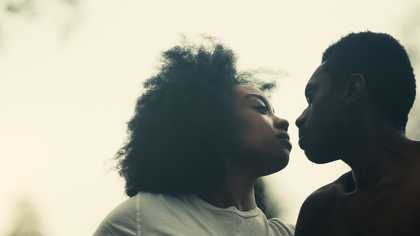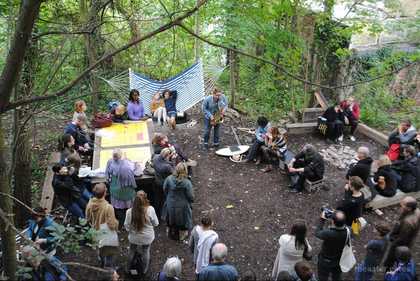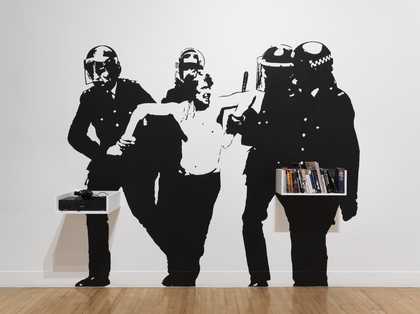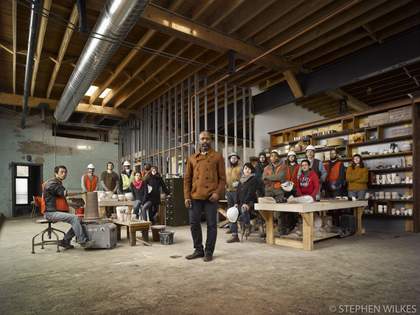
Theater Gates in his Chicago Studio, 2013
©Stephen Wilkes Photography
Theaster Gates is a social practice installation artist living and working in Chicago, United States. Social practice is art which involves people and communities.
He began his career studying urban planning, and carried out a joint masters in religion, ceramics and city design. Thanks in part to these influences he now brings activism, project management and urban planning to his work.
He used to be a potter
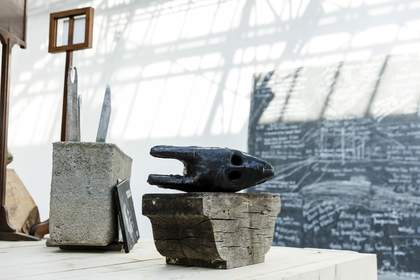
Installation view of Amalgam at the Palais de Tokyo, Paris, 20 February – 12 May 2019
© Theaster Gates and courtesy of the artist.
Photo: Chris Strong.
Before installations, Gates made pots, and here he explains how this led him to where he is now:
I spent about 15 years making pots … you very quickly learn how to make great things out of nothing. I feel like as a potter you also start to learn how to shape the world.
How to revive a neighbourhood: with imagination, beauty and art, TED Talk
Pottery and ceramics continue to play a big part in Gates’s work. In the early 2000s he started his Plate Convergences events, where local people would come together to eat off plates he had designed and made. While he also makes ceramics to show in exhibitions, with works such as Tarred Vessel 2015.
He responds to social history
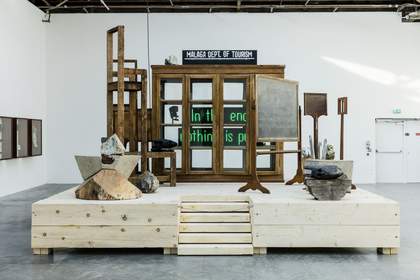
Installation view of Amalgam at the Palais de Tokyo, Paris, 20 February – 12 May 2019
© Theaster Gates and courtesy of the artist.
Photo: Chris Strong.
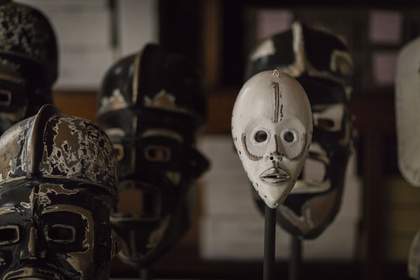
Installation view of Amalgam at the studio of Theaster Gates
© Theaster Gates and courtesy of the artist.
Photo: Chris Strong.
In his exhibition Amalgam, Gates looked at the history of Malaga island in Maine, United States. In 1912, the state governor evicted the island’s mixed-race population with no offer of housing or support. At this time, racial segregation was still enforced across the US and some states made mixed-race relationships illegal. Gates’s body of work responds to this little-known story, connecting it with the wider history of African-American people.

In Civil Tapestry 4 2011, Gates collected old fire hoses and arranged them to resemble a 1960s abstract painting. Hoses like these were used to break up peaceful protests during the Civil Rights movement, injuring many people.
He rebuilt a neighbourhood
… and told all about it in his Ted Talk:
One of the archives that we'll have there is this Johnson Publishing Corporation. We've also started to collect memorabilia from American history, from people who live or have lived in that neighbourhood. Some of these images are degraded images of black people, kind of histories of very challenging content, and where better than a neighbourhood with young people who are constantly asking themselves about their identity to talk about some of the complexities of race and class?
In some ways, the bank represents a hub, that we're trying to create a pretty hardcore node of cultural activity, and that if we could start to make multiple hubs and connect some cool green stuff around there, that the buildings that we've purchased and rehabbed, which is now around 60 or 70 units, that if we could land miniature Versailles on top of that, and connect these buildings by a beautiful greenbelt -- (Applause) -- that this place where people never wanted to be would become an important destination for folk from all over the country and world.
In some ways, it feels very much like I'm a potter, that we tackle the things that are at our wheel, we try with the skill that we have to think about this next bowl that I want to make. And it went from a bowl to a singular house to a block to a neighbourhood to a cultural district to thinking about the city, and at every point, there were things that I didn't know that I had to learn. I've never learned so much about zoning law in my life. I never thought I'd have to. But as a result of that, I'm finding that there's not just room for my own artistic practice, there's room for a lot of other artistic practices.
So people started asking us, "Well, Theaster, how are you going to go to scale?" and, "What's your sustainability plan?"
And what I found was that I couldn't export myself, that what seems necessary in cities like Akron, Ohio, and Detroit, Michigan, and Gary, Indiana, is that there are people in those places who already believe in those places, that are already dying to make those places beautiful, and that often, those people who are passionate about a place are disconnected from the resources necessary to make cool things happen, or disconnected from a contingency of people that could help make things happen. So now, we're starting to give advice around the country on how to start with what you got, how to start with the things that are in front of you, how to make something out of nothing, how to reshape your world at a wheel or at your block or at the scale of the city.
June Cohen: Thank you. So I think many people watching this will be asking themselves the question you just raised at the end: How can they do this in their own city? You can't export yourself. Give us a few pages out of your playbook about what someone who is inspired about their city can do to take on projects like yours?
Theaster Gates: One of the things I've found that's really important is giving thought to not just the kind of individual project, like an old house, but what's the relationship between an old house, a local school, a small bodega, and is there some kind of synergy between those things? Can you get those folk talking? I've found that in cases where neighbourhoods have failed, they still often have a pulse. How do you identify the pulse in that place, the passionate people, and then how do you get folk who have been fighting, slogging for 20 years, reenergized about the place that they live? And so someone has to do that work. If I were a traditional developer, I would be talking about buildings alone, and then putting a "For Lease" sign in the window. I think that you actually have to curate more than that, that there's a way in which you have to be mindful about, what are the businesses that I want to grow here? And then, are there people who live in this place who want to grow those businesses with me? Because I think it's not just a cultural space or housing; there has to be the recreation of an economic core. So thinking about those things together feels right.
JC: It's hard to get people to create the spark again when people have been slogging for 20 years. Are there any methods you've found that have helped break through?
TG: Yeah, I think that now there are lots of examples of folk who are doing amazing work, but those methods are sometimes like, when the media is constantly saying that only violent things happen in a place, then based on your skill set and the particular context, what are the things that you can do in your neighborhood to kind of fight some of that? So I've found that if you're a theater person, you have outdoor street theater festivals. In some cases, we don't have the resources in certain neighborhoods to do things that are a certain kind of splashy, but if we can then find ways of making sure that people who are local to a place, plus people who could be supportive of the things that are happening locally, when those people get together, I think really amazing things can happen.
JC: So interesting. And how can you make sure that the projects you're creating are actually for the disadvantaged and not just for the sort of vegetarian indie movie crowd that might move in to take advantage of them.
TG: Right on. So I think this is where it starts to get into the thick weeds.
JC: Let's go there. TG: Right now, Grand Crossing is 99 percent black, or at least living, and we know that maybe who owns property in a place is different from who walks the streets every day. So it's reasonable to say that Grand Crossing is already in the process of being something different than it is today. But are there ways to think about housing trusts or land trusts or a mission-based development that starts to protect some of the space that happens, because when you have 7,500 empty lots in a city, you want something to happen there, but you need entities that are not just interested in the development piece, but entities that are interested in the stabilization piece, and I feel like often the developer piece is really motivated, but the other work of a kind of neighborhood consciousness, that part doesn't live anymore. So how do you start to grow up important watchdogs that ensure that the resources that are made available to new folk that are coming in are also distributed to folk who have lived in a place for a long time.
JC: That makes so much sense. One more question: You make such a compelling case for beauty and the importance of beauty and the arts. There would be others who would argue that funds would be better spent on basic services for the disadvantaged. How do you combat that viewpoint, or come against it?
TG: I believe that beauty is a basic service. (Applause) Often what I have found is that when there are resources that have not been made available to certain under-resourced cities or neighbourhoods or communities, that sometimes culture is the thing that helps to ignite, and that I can't do everything, but I think that there's a way in which if you can start with culture and get people kind of reinvested in their place, other kinds of adjacent amenities start to grow, and then people can make a demand that's a poetic demand, and the political demands that are necessary to wake up our cities, they also become very poetic.
JC: It makes perfect sense to me. Theaster, thank you so much for being here with us today. Thank you. Theaster Gates.
In 2009 Gates began what is now known as the Dorchester Projects. He was influenced by the high numbers of abandoned buildings in his home neighbourhood of South Side Chicago. To help revitalise the area, he bought and renovated a building on Dorchester Avenue. He now has numerous buildings in the area, including the Stony Island Arts Bank. This former bank, built in 1923, now houses a gallery space alongside Gates’s collections of records, magazines and other artefacts from African-American history.
He rescues materials
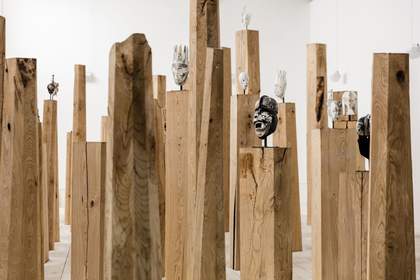
Installation view of Amalgam at the Palais de Tokyo, Paris, 20 February – 12 May 2019
© Theaster Gates and courtesy of the artist.
Photo: Chris Strong.
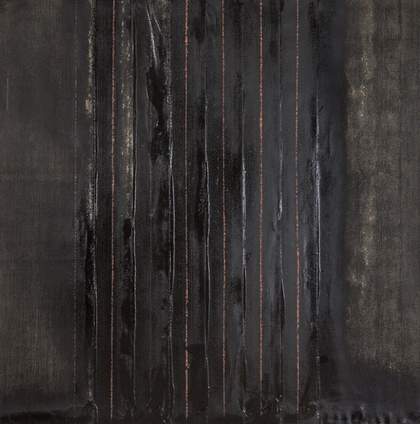
Theaster Gates An Overlapping Love 2014
Image is courtesy of White Cube
© Theaster Gates
Photo: Sarah Pooley
Gates often works with materials that have been discarded. As part of Amalgam, one installation uses over 70 pillars made from ash trees that were going to be destroyed.
These trees were dying. A miller said they were not fit for timber. Useless. Somewhere in the death of a tree is the truth of its strength.
Amalgam, Tate Liverpool
Gates also creates many works using an old tar kettle from his father’s time working as a roofer. These include his Tar Paintings and pieces like Tarred Vessel 2015. The results are beautifully simple yet rich with family history.
He's in a band
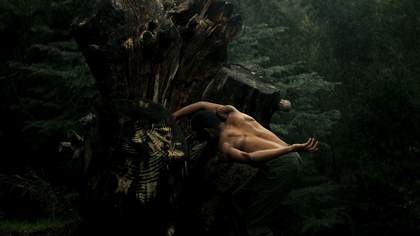
Still from the film Dance of Malaga, 2019
© Theaster Gates and courtesy of the artist.
Photo: Chris Strong
Gates’s band The Black Monks are a consistent presence throughout his art projects. The group take their inspiration from the blues and gospel tradition in African American communities in the south of the US.
They have taken part in many of Gates’s projects, including recording the score for his film Dance of Malaga 2019. This film also saw Gates collaborate with African American choreographer Kyle Abraham on a new dance filmed on Malaga island. Abraham’s piece The Runaway was recognised by the New York Times as one of the best dances of 2018.
Theaster Gates: Amalgam is at Tate Liverpool 13 December – 3 May 2020

